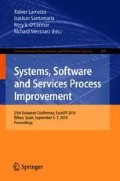Abstract
In early 2018, the second edition of ISO 26262:2018 [1] functional safety standard for road vehicles, was released. One of the main challenges in safety analysis is the decision on suitability of dependent failures. Many discussions ensue on the suitability and the potential impact of any common cause or dependent failures. ISO 26262 parts 9 and 11 give guidance of the categories of dependent failures initiators, but how to gauge acceptability is not so easily quantified. There is a lot of excellent literature on calculating failure rates for common causes, but this information may not easily support design teams in assessing the dependency of the 7 groups of dependent failure initiators listed in ISO 26262-9:2018. IEC 61508 uses a grading system based on a series of questions, however it relates any score gained to the beta factors used in calculating failure rates. Ultimately it is desirable for dependent failures analysis to produce a quantitative result, but not one that feeds into failure rates, as many decisions based on failure rates involve software or system level considerations and are systematic rather than random. One other significant factor in the dependent failures analysis is that many products being assessed against ISO 26262 were not originally designed to meet the standard and are being adapted to comply. In this case an assessment of additional safety mechanisms and the quality of them is key. This paper proposes a quantitative approach to grade dependent failures analyses such that an acceptability criterion can be defined for different ASILs.
Access this chapter
Tax calculation will be finalised at checkout
Purchases are for personal use only
References
ISO DIS 26262:2018 Road vehicles – Functional safety
Faller, R.: Specification of a software common cause analysis method. In: Saglietti, F., Oster, N. (eds.) SAFECOMP 2007. LNCS, vol. 4680, pp. 162–171. Springer, Heidelberg (2007). https://doi.org/10.1007/978-3-540-75101-4_16
IEC 61508:2010 Functional safety of electrical/electronic/programmable electronic safety-related systems
Sundaram, P., D’Ambrosio, J.G.: Controller Integrity in Automotive Failsafe System Architectures. Delphi Corporation. SAE Technical Paper Series 2006-010840
ISO 14971 Medical Devices - Application of risk management to Medical Devices
Author information
Authors and Affiliations
Corresponding author
Editor information
Editors and Affiliations
Rights and permissions
Copyright information
© 2018 Springer Nature Switzerland AG
About this paper
Cite this paper
Young, A., Walker, A. (2018). Qualifying Dependent Failure Analysis Within ISO26262: Applicability to Semiconductors. In: Larrucea, X., Santamaria, I., O'Connor, R., Messnarz, R. (eds) Systems, Software and Services Process Improvement. EuroSPI 2018. Communications in Computer and Information Science, vol 896. Springer, Cham. https://doi.org/10.1007/978-3-319-97925-0_27
Download citation
DOI: https://doi.org/10.1007/978-3-319-97925-0_27
Published:
Publisher Name: Springer, Cham
Print ISBN: 978-3-319-97924-3
Online ISBN: 978-3-319-97925-0
eBook Packages: Computer ScienceComputer Science (R0)

